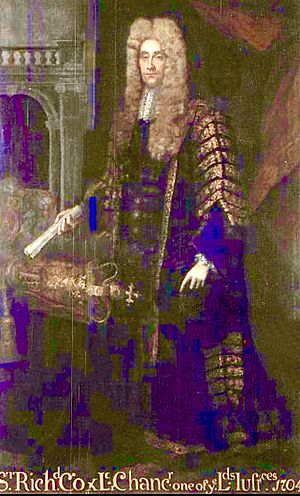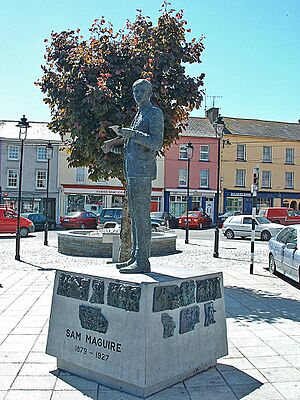Sir Richard Cox, 1st Baronet facts for kids
Quick facts for kids
Sir Richard Cox
|
|
|---|---|

Sir Richard Cox, 1st Baronet
|
|
| Lord Chancellor of Ireland | |
| In office 1703–1707 |
|
| Monarch | Queen Anne |
| Preceded by | John Methuen |
| Succeeded by | Sir Richard Cox, 2nd Baronet |
| Personal details | |
| Born | 25 March 1650 |
| Died | 3 May 1733 |
| Alma mater | Gray's Inn, London |
Sir Richard Cox, 1st Baronet (born March 25, 1650 – died May 3, 1733) was an important Irish lawyer and judge. He held several high positions in Ireland. These included being the top judge for common legal cases, the Lord Chancellor of Ireland (a very senior legal and political role), and the top judge for the King's Bench (another high court). He was a key figure in Irish law and politics during his time.
Contents
Early Life and Family Background
Richard Cox was born in a town called Bandon in County Cork, Ireland. His family had moved to Ireland from England around the year 1600. Sadly, his family lost their land during the Irish Rebellion of 1641.
Richard's father, Captain Richard Cox II, passed away in 1651. His mother, Katherine Bird, also died shortly after. This meant Richard became an orphan by the age of three. He was then raised by his grandparents and his uncle, John Bird, in County Cork.
Education and Early Choices
Richard went to school in Clonakilty. After school, he spent some time without a clear plan. However, he inherited a small amount of property from his grandfather. This allowed him to travel to England to study law.
Starting a Legal Career
Richard Cox completed his law studies at Gray's Inn in London in 1673. This was a famous place where lawyers were trained. After his studies, he worked for the Earl of Cork, learning about how courts were run on large estates.
Marriage and Moving On
In 1674, Richard married Mary Bourne. She was only fifteen years old. He later said he was misled about how much money her family would give as a dowry (money or property a bride brings to a marriage). Even though he had arguments with his mother-in-law about the dowry, his marriage to Mary was a happy one.
Because of the family disagreements, he moved to the countryside for a while. Then, he decided to build a successful career as a lawyer in Ireland. He became very good at his job and earned a lot of money.
Early Legal Roles
Richard Cox was appointed the Recorder of Clonakilty in 1675. A recorder was a judge in a local court. He also became the Recorder of Kinsale. He bought land in Clonakilty around 1687. However, he lost these positions when King James II came to power.
He then moved to Bristol, England, where he continued to work as a lawyer. In Bristol, he met Sir Robert Southwell, an important Irish diplomat. Sir Robert introduced Richard Cox to the Duke of Ormonde, who became a powerful supporter for Richard's career.
A Career in Politics and as a Judge
Richard Cox returned to Ireland and took part in the Battle of the Boyne in 1690. This was a very important battle in Irish history. After King William's side won, Cox helped write a special document called the Declaration of Finglas. This document offered protection to people who had fought against the King if they stopped fighting. King William was very impressed with Cox's writing.
Rising Through the Ranks
Richard Cox was made a knight by King William in 1692. This was a great honor. Later, in 1706, he became a baronet, which is a hereditary title.
He was appointed Recorder of Waterford and a judge in the Court of Common Pleas (Ireland) in 1690. He also became the military governor of Cork and a member of the Privy Council of Ireland in 1692. The Privy Council was a group of important advisors to the King.
Standing Up for Justice
Richard Cox supported the Treaty of Limerick. This treaty offered fair terms to those who had been defeated in the war. When the government did not keep its promises from the treaty, Cox spoke out against it. He believed it was wrong to break a promise. Because of this, he was removed from the Privy Council in 1695.
However, this was only a temporary setback. He became the Chief Justice of the Irish Common Pleas in 1701. He was also reappointed to the Privy Council in the same year.
Views on Religion and Law
While Richard Cox believed that people should be treated fairly, he was not supportive of Roman Catholics in Ireland. He strongly supported the Penal Laws. These laws were designed to limit the rights of Catholics. As Lord Chancellor, he helped pass the Popery Act of 1703. This law aimed to reduce the power of Catholic landowners.
He became the Lord Chancellor of Ireland in 1703. Later, he was the Lord Chief Justice of the Queen's Bench from 1711 to 1714. He had been dismissed from his role in 1707 because he disagreed with a plan to change a law about religious dissenters (people who did not follow the main church).
Later Years and Legacy
Richard Cox lived for 20 years after he retired. He passed away in 1733 from a sudden illness in the Great Hall of the Royal Hospital, Kilmainham.
In his later years, he worked hard to improve the town of Dunmanway. He helped the town get a special permission from the King to hold fairs and market days. He also encouraged the local flax industry, which helped people make cloth. Thanks to his efforts, Dunmanway grew into a busy town with about 600 people by the time he died.
Personal Life and Family
Richard Cox and Mary Bourne were married on February 26, 1674. Mary was born in 1658 in County Cork and passed away in 1715. Richard often said she was a very good wife.
They had many children, possibly as many as twenty-one, though only fifteen can be clearly identified. Some of their children died when they were very young. Of those who grew up, their oldest son, also named Richard, passed away before his father. Another son, Michael, became an important church leader, the Archbishop of Cashel, from 1754 to 1779. Michael built a beautiful house called Castletown Cox, which is still standing today.
Richard Cox's letters show he had a lively and charming personality. He was happy about his large family and enjoyed good food, drink, music, and nice clothes. People generally thought he was an honest and fair judge. However, his strong opinions against Catholics meant he might not have been completely fair in cases involving religion.
Richard Cox's grandson, Sir Richard Cox, 2nd Baronet, inherited his title and lands after his death.
 | Emma Amos |
 | Edward Mitchell Bannister |
 | Larry D. Alexander |
 | Ernie Barnes |


